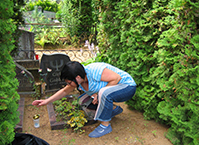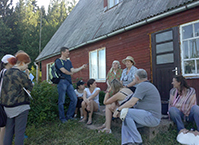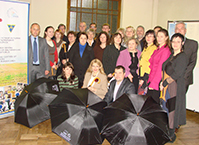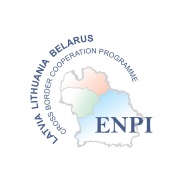Were the houses decorated on Līgo [Jāņi; Midsummer night festival]?
Categories: Liga Seikste-Deksne
Of course. Front door was decorated in almost every house. Well, but if Janis’ gate was not decorated, that was a great shame. For that, people teased in Līgo songs in the same way as for unweeded garden, for unmowed roadside and things like that. Inside the house, people usually placed birch-boughs in the corners, but nobody raved much about it. However, some people said that all the decorations, all those Summer solstice plants that are brought into the room are good for making bathhouse whisks. And, generally speaking about the decorations for splendour, beauty in all those annual festivals, although it was not emphasized that those were annual festivals, all those decorations – they had some rational basis. Where are they used afterwards? Thus, new birch trees are cut in some densely grown stand, they are placed in the corners of the room, then the twigs are cut off and made into bath twigs, the very branches are stuck in peas. This is how it looked.
In the 90ies, all these traditions, when Līgo festivities were officially recognized, the day became an official holiday, but all the excitement, all enthusiasm somehow diminished. The maintenance of the feeling of this festival was mainly in the hands of the kolkhoz amateur artists. The villagers seemed to tend to those places; there they could be together, it was different from staying at home and celebrating individually. Yes, the holiday was celebrated on the state’s level, but in relation to the economic crises, until those 90ies, many events were supported by kolkhozes not only morally, but also financially. When it became the responsibility of people themselves, respectively, the celebration affected their own wallets, and therefore that splendour disappeared. Of course, people gathered at the nearest neighbour, whose name was Jānis, visited other Jānises in the neighbourhood, they celebrated, but that mass together-being, when it was the festival of the whole village, disappeared. That got somehow divided and celebrated in the village households separately.
Audio
Researcher: Dr. philol. Valentīns Lukaševičs, Daugavpils Universitāte










